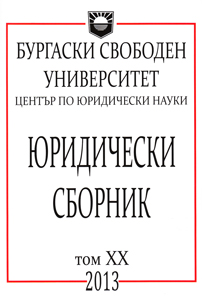ПРАВОТО НА КОМУНИКАЦИЯ КАТО ОСНОВНО ЧОВЕШКО ПРАВО И НЕГОВОТО „РЕГУЛИРАНЕ”
THE RIGHT OF COMMUNICATION AS A MAIN HUMAN RIGHT AND HIS "REGULATORY"
Author(s): Borislav GradinarovSubject(s): Law, Constitution, Jurisprudence
Published by: Бургаски свободен университет
Keywords: communication; human rights; cultural; peace;
Summary/Abstract: The article analyzes the right of communication as one of the fundamental human rights. Although it is included in the group of the fundamental human rights of the third generation in the late 70s of the 20th century, together with the right to peace, common cultural heritage, healthy and favorable environment as well as the protection of personal data and the protection of the environment, it becomes crucial as late as at the end of the last century, especially during the first decade of the 21st century. The reason lies in its very nature and its dependence on the available technological tools and resources for its exercise. The problem is not quite a matter of theoretical classification - will we qualify the communication right as a fundamental constitutional right or as a fundamental human right. In the first case the system of its protection and regulation of its exercise should be constructed so that the public interest to have priority over the individual, as it is now. In the second case, if the communication right is enshrined as a fundamental human right under the Universal Declaration of Human Rights, should regard it as a right whose medium is every human being. So under this hypothesis hierarchy should be different – individual interests and needs of communication must take precedence over public of preserving the integrity and orderly functioning of the whole. The qualification of the right of communication as a fundamental human right redefine also mechanisms that should ensure its exercise. Unlike the perception of access to communication and information as an access to limited public resource that should be allocated and regulated in the public interest by specifically established state (or independent) bodies, the definition of the right to communication as a basic human right requires another mechanism. The focus in this case should not be placed on regulation but on its security and protection of limitation. Without neglecting the specificities of this right, exercising and means of its conservation should be of the same order of magnitude, such as the protection of the right to life, right to liberty, the right to humane treatment, freedom of association, etc.
Journal: Юридически сборник
- Issue Year: XX/2013
- Issue No: 1
- Page Range: 46-58
- Page Count: 13
- Language: Bulgarian

